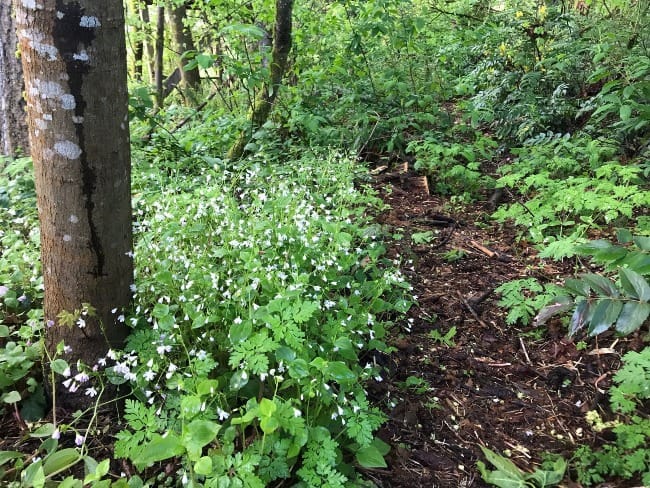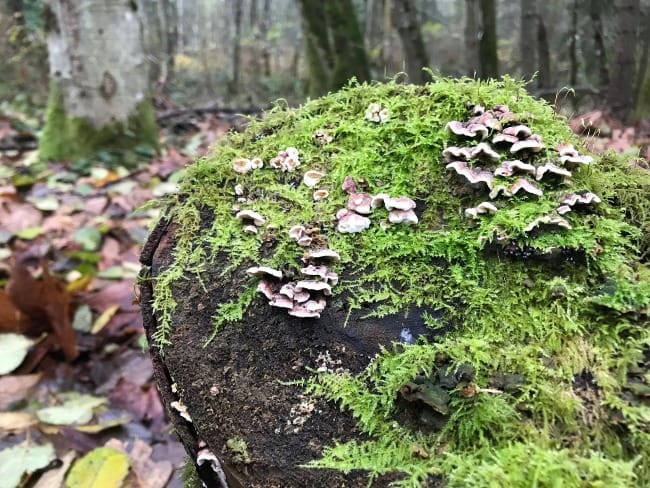The poem Lost by David Wagoner, a Pacific Northwestern poet originally from the Midwest who died last month, speaks about the movement from being lost to being found—from disconnection and disorientation to connection and placement. This movement from one to the other is accomplished, ironically, according to the poem, by standing still.
Lost by David Wagoner
Stand still. The trees ahead and bushes beside you
Are not lost. Wherever you are is called Here,
And you must treat it as a powerful stranger,
Must ask permission to know it and be known.
The forest breathes. Listen. It answers,
I have made this place around you.
If you leave it, you may come back again, saying Here.
No two trees are the same to Raven.
No two branches are the same to Wren.
If what a tree or a bush does is lost on you,
You are surely lost. Stand still. The forest knows
Where you are. You must let it find you.
From Traveling Light: Collected and New Poems ©1999 by David Wagoner.
Imagine yourself in a forest you have never been in before. You have somehow landed here and are dislocated and disoriented in this place—lost. In addition to not recognizing your exact location, you don't recognize anything about this place. You don't know what causes the noises you hear. You don't know what plants are edible and inedible. You don't know where the streams flow. It is completely unfamiliar and unknown.
When we are lost, either physically or emotionally, perhaps the most common reaction is to try to get ourselves out of that place as quickly as possible, wherever it is. That might mean fleeing immediately to somewhere else—which may or may not work, depending on how large the area is where we find ourselves and whether we know the direction we need to go to get out of it.
There are many ways that people feel disconnected, based in dislocation in a place they fear and misunderstand. By only trying to flee from that place—“get me out of here and get me out of here right now!”—we lose the possibility of seeing what is around us and learning anything about ourselves or about the place where we currently are.
Another approach to becoming not lost (besides removing yourself from the place where you feel lost), is through recognizing that the lostness is not inherent to the place itself; it is a result of what we ourselves do or don’t bring into that particular place. If we enter into the place with an attitude of respect and listening, the place is at least partially knowable, given sufficient time. After all, it is full of creatures that already do know it. This receptivity is the response the poem beckons the reader into.

The poem encourages the reader first of all to “stand still.” Standing still means you can hear something besides your own panicked breath and the tramp of your feet on the leaves. You can look to see what is around you. You can see the particulars. You are not ruled by panic, but by curiosity. What is this? What does it do? What can I learn from this place? If you stand still and listen with the intent to learn about the place, and to reveal yourself as well, it becomes possible to distinguish one tree from another, one branch from another, to know the particulars of the place—as the creatures that live there do.

By revealing yourself, the place gets used to you as well and when that happens in a forest, other creatures will often come out from their hiding places in your presence. Gradually, it becomes a known place, something you call “here” rather than a place of disorientation that you only think of as "there."
As you return to a place and it becomes "here" rather than a place of lostness, you will become familiar, meaning intimate, on a family footing with each other. It makes me think of the change that happened in how I viewed my neighborhood as I began walking there in the early days of the pandemic rather than driving near to my workplace and walking there. I began to know places near my house where I might hear owls hooting—and maybe even see one. I watched particular trees change out buds for blossoms and then fruit. The paths I took became more than just the paths themselves, but also all the living and non-living creations I knew and recognized along the paths. The area became "here" rather than "there" to me.

Do you know the particulars of the place you call home? Do you know what trees grow in your backyard or in the sidewalk median outside your apartment? Do you know your neighbors, both human and non-human? To become less lost in a place, you need to either leave it or settle into it. In Jeremiah 29, the Israelites are given instructions for how they should live in a place of exile—a place of deep lostness for them.
This is what the LORD of Hosts, the God of Israel, says to all the exiles who were carried away from Jerusalem to Babylon: “Build houses and settle down. Plant gardens and eat their produce. Take wives and have sons and daughters. Take wives for your sons and give your daughters in marriage, so that they too may have sons and daughters. Multiply there; do not decrease. Seek the prosperity of the city to which I have sent you as exiles. Pray to the LORD on its behalf, for if it prospers, you too will prosper.”
Like the readers of the poem, the Israelites are told to become familiar with the place they will be living, make themselves part of it, identify with it and make it their home. There is no doubt that this can be difficult and even wrenching, depending on what the place of lostness is like, but ultimately, when we come upon something unknown and disorienting, there are two ways to handle it: leave or not leave. If we stay, we can become better acquainted with that strange thing. If we flee from it, either physically or emotionally, it will always remain strange to us.
Reflection Questions: How do you respond when you become lost? How might you stand still instead of fleeing the next time you are lost, either physically, spiritually, or emotionally?
Louise

[1] Genzlinger, Neil, David Wagoner, Prolific Poet of the Northwest, December 29, 2021, https://www.nytimes.com.